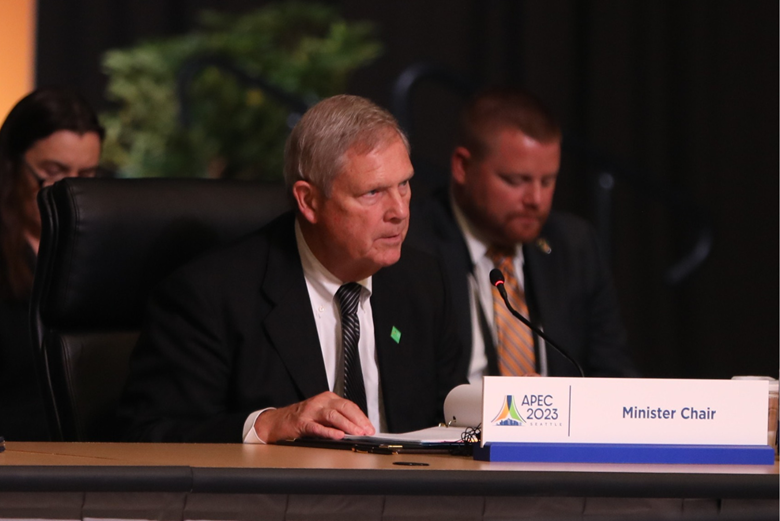Innovative Technologies, Digital Agriculture Necessary to Advance Sustainable, Resilient Agri-food Systems

Leveraging innovation and science, including biotechnology, can provide farmers, fishers, foresters, and other producers with the tools they need to improve productivity, sustainability and resilience.
In 2011, the United States hosted its last APEC in an event that foreshadowed the challenges of today. We cannot wait another 12 years to act.
The time is now, and together we can achieve sustainable, equitable, and resilient agri-food systems, which is the premise of our agriculture theme for this host year.
To achieve this endeavor, it is important to recognize that food and nutrition security requires food be simultaneously available, accessible and stable. This is what I told APEC’s food security ministers a few weeks ago when I hosted them in Seattle.
Constrictions within any of these components can result in food and nutrition insecurity. But the APEC community shares a commitment to addressing global food needs now, so that we can build resilient systems that can absorb future shocks, like pandemics, conflict, severe weather, and climate change.
How we do so is challenging, but together, we all believe it is possible. We must work to collaborate, to share best practices and information as we all learn more about how to mitigate and adapt to a changing climate.
Increasing agricultural productivity is essential to meeting the needs of a growing global population. In order to produce more, while minimizing environmental impacts, we must leverage innovation and foster new ways of doing things. Only by leveraging innovation and science, including biotechnology, can we provide our farmers, fishers, foresters, and other producers with the tools they need to improve productivity, sustainability and resilience.
APEC economies should increase research in the climate-resilient agricultural innovations that contribute to building sustainable and resilient agricultural sectors. These advances must be made accessible to producers of all sizes and types, in all parts of the world. Open markets and science-driven regulatory regimes are also critical to innovative new technologies.
Climate change adaptation and mitigation, and sustainable agricultural productivity growth are inextricably linked to food and nutrition security, further underscoring the critical role innovation plays and will continue to play in the future to address these challenges.
Accelerating agricultural productivity growth to reduce agriculture’s environmental footprint and reducing greenhouse gas (GHG) emissions from agriculture is also imperative. Without agricultural productivity growth, meeting the world’s current and future food needs would require increased use of natural resources, including the expansion of agriculture into forests and other critical ecosystems.
Such an expansion would threaten our ability to meet GHG emissions reduction goals, even if other human activities were dramatically curtailed. The consequences of failing to accelerate agricultural productivity growth could be dire. Research points to higher food prices, an increase in food and nutrition insecurity and hunger, an increase in poverty, an increase in natural resource use, and an increase in GHG emissions to name a few.
Changes to our agricultural and food systems can only happen at the needed scale and speed if farmers and other rural stakeholders reap the benefits of sustainable climate-smart policies and practices as they strive to maximize their productivity and profitability.
To this end, the US Department of Agriculture (USDA) is investing more than $3 billion to support 141 projects that will deliver significant impacts for producers and communities of all types and sizes, in all 50 US states. These projects will expand markets for climate-smart commodities, leverage the greenhouse gas benefits of climate-smart commodity production, and provide direct, meaningful benefits to production agriculture, including small and underserved producers.
For example, USDA is supporting projects that will build climate-smart rice markets and work to reduce methane emissions in rice production through the adoption of alternate wetting and drying, furrow irrigation, and other climate smart practices. Another project plans to provide technical assistance and make direct payments to small-scale dairy farmers to implement climate-smart grazing management.
The USDA also has a project focused on building markets and providing funding to farmers through outcome-based contracts for the reduction and removal of carbon dioxide through the adoption of new climate-smart practices among major commodities such as corn, soybeans and wheat.
In total, the United States anticipates that these projects will expand hundreds of market streams for producers, reach more than 60,000 farms encompassing more than 25 million acres of working land, and sequester more than 60 million metric tons of carbon dioxide.
We recognize that many lessons learned through these domestic opportunities may be applicable on a global scale. That is why the United States is committed to sharing information, best practices, and resources with the international community, and is doing so by standing up an International Climate Hub.
During the meetings in Seattle, we heard how public-private partnerships are critical to the agricultural sectors’ ability to move towards sustainable, resilient agri-food systems which will enable our region to address growing food security concerns. The information and recommendations from fellow agricultural ministers, heads of delegation, as well as colleagues, provided insight and encouragement.
As we work together to feed an increasing world population with limited resources due to the challenges posed by a changing climate, it is my hope that APEC members can strengthen cooperation and drive the Policy Partnership on Food Security to become a meaningful venue for proactive discourse and public-private solution building.
***
Thomas Vilsack is the United States Secretary of Agriculture and chair of the APEC Food Security Ministerial Meeting.

